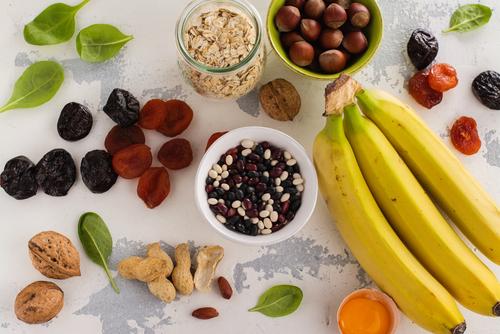Mention high blood pressure and most of the diet-conscious among us think "lower salt intake" to manage it. And there has been controversy about who should decrease their salt consumption and by how much — as we've previously discussed. What's less often addressed is the role of potassium (K+) in the management of hypertension (HTN). However, a recent review in the American Journal of Physiology addresses the possibility that diets higher in K+ may well be as important a means of reducing the toll of HTN — thus decreasing the prevalence of cardiovascular and kidney diseases.
Led by Dr. Alicia A. McDonough, a team of investigators from the University of Southern California in Los Angeles reviewed data from population, interventional, and mechanistic studies to determine the relative influences of dietary sodium and potassium on the incidence of HTN.
Population studies revealed that when people used to a isolated society moved to an industrialized society, the ratio of sodium (Na+) to K+increases in their diets. In addition, vegetarians, who tend to consume more K+ than other dietary groups, also had a lower dietary NA+:K+ ratio and lower mean arterial blood pressure. They also noted a large study in which the association of urinary Na+ excretion with cardiovascular events was U-shaped, i.e. the risk was increased with very low as well as very high Na+. And a large (over 500,000 people) study in China demonstrated that the risk of major cardiovascular events was much lower in those who reported consuming fruit (a rich source of K+) daily or frequently than in those who rarely or never ate fruit.
They also reviewed interventional studies in which, for example, dietary K+ was supplemented. One such study in hypertensive individuals who controlled their condition with medication demonstrated that K+ supplementation for one year led to over 80 percent of the participants reducing their use of medications by 50 percent, compared to 29 percent of the non-supplemented control group. Further, consumption of the DASH diet (Dietary Approaches to Stop Hypertension) (1) for 30 days resulted in lower blood pressure whether the individuals consumed low, moderate, or high levels of Na+.
Mechanistically, the authors discuss the handling of both Na+ and K+ by the kidney, explaining (based mostly on animal studies) that among other factors, a diet with a lower Na:K ratio, with or without lowering dietary NA+, causes a decrease in the activity of the sodium-chloride co-transporter in the kidney, and a decrease in blood pressure.
Thus, based on these various types of studies, the authors concluded: "Along with exercise, consuming a surfeit of dietary K is a good strategy, since our physiology evolved and was optimized to deal with high- K –low-Na intake, often referred to a Paleolithic diet." And they made the following recommendations:
1) promote efforts to reduce Na artificially added to food during processing to reduce mortality, 2) promote public policies to increase dietary intake of K from plant-based sources, 3) make fruits and vegetables available at lower cost and more accessible, 4) develop food-processing technology that retains natural composition of cations [positive ions such as K+], and 5) require manufacturers to display K content on nutrition facts panels.
While these recommendations would require some changes in public policy, obviously one thing that individuals can do is to increase their consumption of fruits and vegetables — the primary source of dietary potassium.
1) DASH diet: emphasizes diets rich in vegetables, fruits, and low-fat dairy products (including whole grains, poultry, fish, and nuts) and reduced in fat, red meat, sweets, and sugar-containing beverages,




